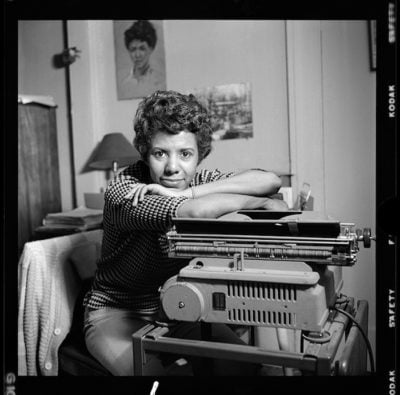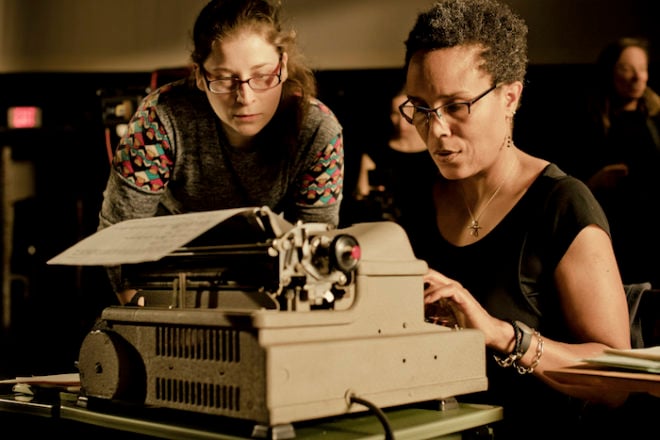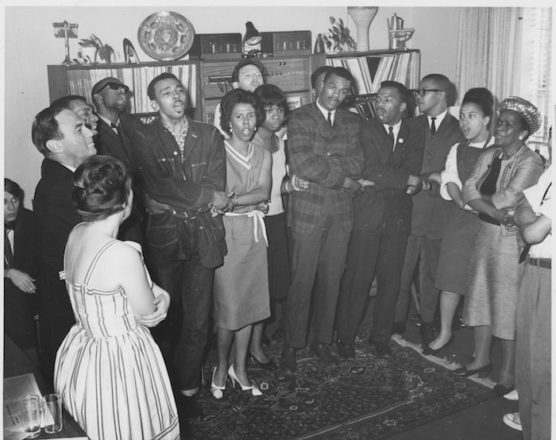Playwright Lorraine Hansberry was a social justice warrior who fought racial discrimination and discrimination against women and used her writing as a vehicle for social change.
Hansberry’s writing was pioneering.
“American Masters – Lorraine Hansberry: Sighted Eyes/Feeling Heart,” the first in-depth look at Hansberry’s complex life, will air tonight on PBS at 9 p.m. The documentary will stream Saturday at pbs.org/americanmasters and on PBS apps.
In 1959, the 28-year-old Chicago native garnered national acclaim and became the first black playwright to win the coveted top award from the New York Drama Critics’ Circle for her play “A Raisin in the Sun.”

Lorraine Hansberry leans over her typewriter in her Greenwich Village apartment on Bleecker Street during her April 1959 photoshoot for Vogue. Photo by David Attie.
LESBIAN VOICE
Two years earlier, Hansberry became a voice for the lesbian community, but this effort was done in secret.
Hansberry, who had concealed her identity as a lesbian, penned an anonymous letter to the editors to The Ladder, the nation’s first subscription-based lesbian magazine and identified herself as a “heterosexually married lesbian.” She also published four short stories about lesbians under the pseudonym Leslie Jones.
ALSO READ: Intersectionality of black, queer identities showcased in professor’s art
Filmmaker and Peabody Award-winner Tracy Heather Strain (“Unnatural Causes,” “I’ll Make Me a World,” “American Experience: Building the Alaska Highway”) used 93 sources, such as Hanberry’s personal papers and archives, including home movies and rare photos, as source material.
HANSBERRY’S LIFE
“Lorraine Hansberry: Sighted Eyes/Feeling Heart,” spotlights not only Hansberry’s lifetime commitment to fighting injustice, but also her talent of using writing as her medium for activism at a crucial time for black civil rights.
The documentary also explores Hansberry’s hidden identity as a lesbian.
Hansberry died of pancreatic cancer in 1965 at the age of 34.
In an interview with Q Voice News, Strain discusses not finding all the answers about Hansberry’s life, her passion for justice, and her legacy.
Here are some excerpts.
Answers, but not all the answers
“Most surprisingly, when I read her papers, I thought I would get answers, but I didn’t,” Strain says. “I wanted to hear what she thought about things in her life. For example, What was it like to be an interracial couple in the 1950s. I thought she would comment on more events of the day. There was no information on her friendship with James Baldwin and Nina Simone.”
A warrior for justice
“Lorraine was aware of injustice from a very young age,” Strain says. “One of the things that she got from her parents was, You try to fix the situation. They were activists. They spent a lot of time and money trying to fix things. You apply your gifts and blessing to uplift the race and make things happen.”

Director-producer Tracy Heather Strain, right, and production assistant Abbi Sauro during reenactment filming for “Lorraine Hansberry: Sighted Eyes/Feeling Heart” at the Strand Theatre in Boston in January 2017. Photo: Eric Levin.
Hansberry’s pen was mightier than the sword
“There will be injustices in the world, and you do your part to help solve them,” Strain says. “She saw her dad use the legal way. She tried journalism, working at Paul Robeson’s Freedom newspaper in Harlem. Paul Robeson believed that artists had a role to play in society. Lorraine used writing as her vehicle for social change.”
Hansberry made the FBI list as a communist sympathizer, but she wasn’t intimidated into silence
“Lorraine had a type of confidence that I admire,” Strain says. “Lorraine started her training to be an outspoken person in the world as a child. She was from a family where they debated things at the table. She spent a lot of time reading. She was constantly educating herself.
“Lorraine taught herself to write a play. Who is this 28 year old who writes something that goes to Broadway? It’s important for this film to show that this didn’t pop out of nowhere.”
Writing for The Ladder
“Lorraine met with Phyllis Lyon, who co-founded the Daughters of Bilitis in 1955,” Strain says. “She gave them money, but told them she couldn’t be public. Lorraine seemed to be very excited.”
Hansberry’s identities didn’t intersect
“Lorraine had these boxes. She compartmentalized a lot,” Strain says. “I’m under the impression that many of her friends who were part of her lesbian circle didn’t know friends in her other circles.
“Lorraine seemed like a very lonely person in many ways,” Strain says. “She had many identities, and they lived apart.”
Lesbian friends
“Lorraine wrote about her lesbian friends in her journals,” Strain says.
“Edie Windsor was friends with Lorraine. Edie remembers giving Lorraine a ride from Philadelphia to New York City, but she didn’t remember any of the details.
“We wanted to speak with some of Lorraine’s lesbian friends, but for whatever reasons, they didn’t want to appear on camera,” Strain says.
Shortly before she died, Hansberry questioned if she was doing enough, if she was a revolutionary
“Her questioning speaks about her character,” Strain says. “Lorraine had lots of gifts. She wanted to do more. It’s very inspiring.”

